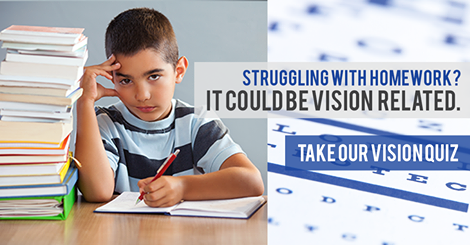
As our children’s school report cards come home, they can tell more than just grades. They may also highlight vision problems that can affect learning. Many children struggle in school not because of a lack of effort but due to undiagnosed vision issues that go beyond 20/20 eyesight.
Vision is a complex process. It includes many skills, over 17 in total. These skills are essential for good visual functioning, including eye tracking and teaming (how their eyes work together. Each component plays a crucial role in interpreting and interacting with the world around us.
What Vision Skills Are Important for Learning
Vision involves more than just seeing clearly. It includes over 17 different skills crucial for effective visual functioning. Here are some of the most important ones:
- Tracking: Helps the eyes follow moving objects smoothly, crucial for reading and sports.
- Focusing (Accommodation): Allows the eyes to shift focus between near and far objects, key for reading and schoolwork.
- Depth Perception: Enables accurate distance judgment, important for coordination in sports and daily tasks.
Besides these main skills, vision includes other vital abilities. These are visual discrimination, which is the ability to differentiate different shapes, colors, and patterns.
Furthermore, visual memory is the capacity to remember what we see. Visual-motor integration is the coordination of what we see with our movements. Each of these skills contributes to a child's overall learning and development.
Unfortunately, many standard school vision screenings focus primarily on basic visual acuity—how well a child can see at a distance. These screenings often overlook the more nuanced skills that are critical for academic success and daily functioning. As a result, children may go undiagnosed with vision-related issues that could significantly impact their learning and development.
Recognizing the Signs of Vision Problems in Children
Vision problems often appear as behaviors that can be mistaken for learning difficulties or behavioral issues. Watch for these common signs:
- Frequently losing place when reading
- Skipping or re-reading lines
- Using a finger to guide reading
- Complaining of headaches or eye strain
- Avoiding close work like reading or homework
- Holding books or screens too close
- Blurred or double vision
- Short attention span during schoolwork
- Struggling with reading comprehension
- Covering one eye or rubbing eyes often
These behaviors aren’t just quirks; they may indicate underlying vision issues. If you see these symptoms on report cards or at home, think about scheduling a vision exam. This can help find out if vision therapy might be helpful.
How Vision Therapy Supports Learning and Development
Vision therapy addresses the visual skills that impact learning. This proven, non-invasive treatment can help children with reading or learning challenges. Our therapy program helps the brain learn to understand visual information better, improving reading skills, focus, and eye-hand coordination.
Dr. David Coleman and Dr. Jeff Coleman perform thorough exams. They check more than 17 vision skills, going beyond regular eyesight tests. We create personalized vision therapy plans for your child’s needs. This ensures they get the right care to support their learning and growth.
Why Choose Coleman Vision for Vision Therapy?
Coleman Vision offers a holistic approach to eye care, treating vision as a critical part of your child’s overall success in school. Vision therapy goes beyond what glasses or contact lenses can correct. It directly addresses skills essential for reading, writing, and daily activities. Our customized therapy programs help children overcome visual challenges, improve academic performance, and gain confidence.
If your child is struggling with vision-related learning problems, don’t wait. Schedule a functional eye exam. Our personalized approach in Joplin, Missouri ensures your child gets the support they need to reach their full potential.
